Prior to the latest census in Australia (2016) the Atheist Foundation of Australia ran a campaign. It was to urge people to mark the “NoReligion” option on the census form. The number that did so was 29.6%, almost double the 16% of 2001, just fifteen years earlier. Christianity is still by far the largest group at 52%. Within Christianity, Catholicism is still the biggest group at 22.6%. While this is a drop, it’s not much of a drop. Personally, my own expectation was that the child sex abuse scandal there would have a bigger effect. It seems Aussies are managing to keep a tight grip on their delusion despite proof of the sexual abuse of thousands of children and its cover up by the Church.
Although Christianity is still by far the biggest group, a whole lot of Christians are in a real tizz! Apparently, in a column in The Australian, columnist Jenniefer Oriel says atheism will lead to a breakdown in liberal democracy. I can’t read the column because The Australian is only available by subscription on-line. The news comes via another Australian media outlet, Christian Daily.
This is the religious profile of Australia on census day from 1966 to 2016.
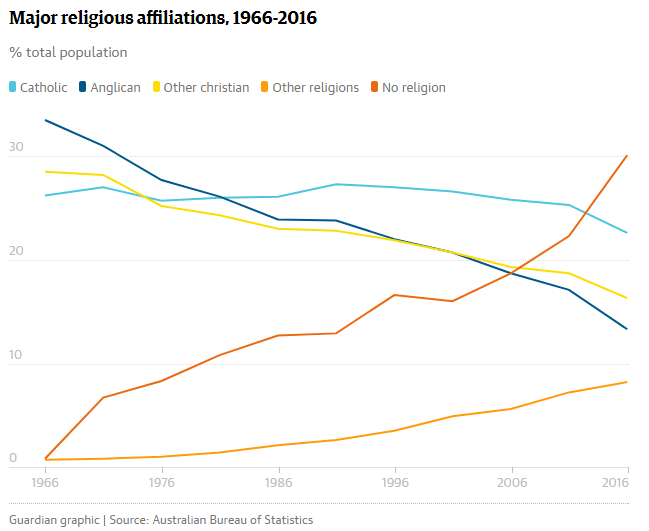
Australia: Major Religious Affiliations 1966-2016 (Source: The Guardian. Click graphic to go to source.)
Christian Daily
The Christian Daily wrote this about Oriel’s article.
Oriel lamented the ongoing intolerance towards Christians and noted that governments in the West are blocking funding for Christian groups and launching propaganda against them in the name of diversity and inclusion. She also brought up the irony that the Christian faith was on a decline, but the West’s core values were essentially based on Christianity, such as staying faithful to a partner and not committing crimes.
While most people consider crimes and other bad behavior as unacceptable, they fail to see that their nation’s core values are aligned with Christianity. In light of this idea, Oriel warned that losing the Christian faith will also extinguish the light of liberal democracy, and the fall of the religion in the West also heralded the death of the greatest civilization in the world.
Assuming this is an accurate portrayal of Oriel’s piece, it’s clearly a load of rubbish. I’ll address these points one at a time.
Further, Oriel’s problem with people checking “no religion” in Australia’s census wasn’t just her problem with atheism, but her issue with Islam. Like many in the West, she thinks Islam is an existential threat to their society. This is really unlikely in my opinion. Like in most Western countries, there just aren’t as many Muslims as people think. And, they chose to live in the West for good reason. In Australia’s case, they make up less than 3% of the population, and it’s thought at least half are non-practicing.
Ongoing Intolerance Towards Christians
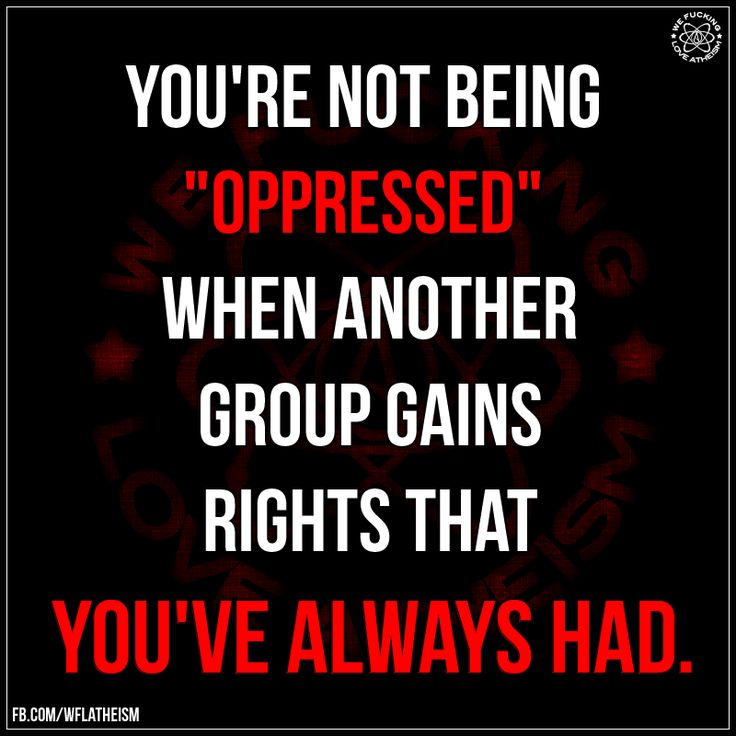 This is a frequent lament of conservative Christians. It’s a cry we often hear from groups as society becomes more equal. It’s something men said a lot at the beginning of the feminist movement, though it’s mostly men’s rights groups that cry it now.
This is a frequent lament of conservative Christians. It’s a cry we often hear from groups as society becomes more equal. It’s something men said a lot at the beginning of the feminist movement, though it’s mostly men’s rights groups that cry it now.
It comes from those who oppose marriage equality. They would have us believe that somehow same-sex couples marrying has a detrimental effect on their own marriages. I’ve yet to hear one explain exactly how!
And it’s the same here. There is not an intolerance of Christians. Christians are losing their position of dominance – their ability to make the decision without consulting anyone else. Because they can no longer force their opinion on everyone else, they are crying intolerance.
It’s not intolerance or oppression when another group gains rights you’ve always had. It’s time to accept that other people have a right to their opinions, and to be heard.
Staying Faithful to Your Partner
This presumably is a reference to the seventh Commandment: Thou shalt not commit adultery.
If I had to name the West’s core values, I’m not sure “staying faithful to your partner” would cross my mind. Besides, if we’re relying on fidelity to keep our civilization going, I think we’re in trouble. Studies show that around half of men and a quarter of women commit adultery. If Oriel is referring to divorce instead, the results aren’t any more promising. Divorce rates are much higher in Christian or formerly Christian countries than the Muslim ones that worry her so much.
The divorce rate in Australia is currently 43%.
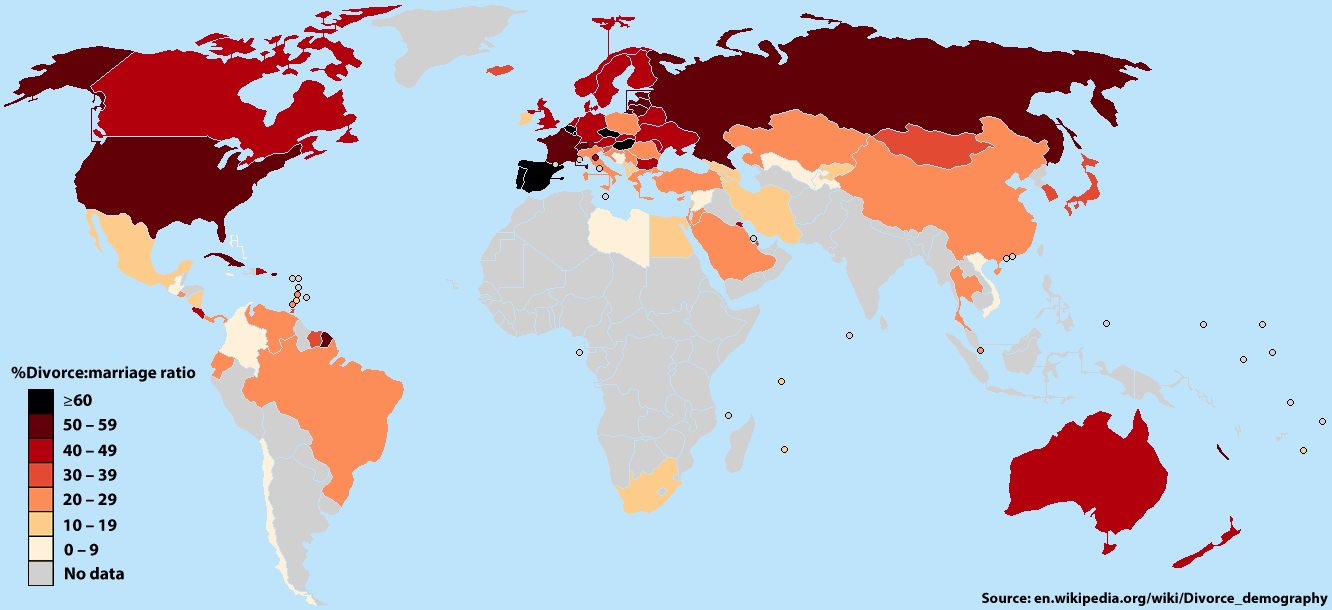
Divorce Demography – Latest Rates Available, 2014 (Sources: Map – Business Insider; Data – Wikipedia. Click graphic to go to Business Insider.)
Besides, Islam is just as anti-adultery as Christianity, if not more so. In Islam, the punishment for adultery is still death by stoning. In Christianity, the New Testament means that it’s now possible to be forgiven for adultery and thus still get to heaven.
Personally, I see the current high rates of divorce in Western countries as a result of the growing empowerment of women. As it’s become possible for women to not need to rely on men financially, they’re no longer trapped in unhappy marriages. I believe divorce rates will drop in the future as religious sexual mores lose their grip on society. More people can and will have responsible sexual relationships without feeling they have to marry. Couples will delay marriage until they are sure the person they are marrying is one they want to commit to for life. This is not, in my opinion, a decision 20-year-olds should be making. Of course, some people that age will get it right, but most won’t.
Divorce Amongst Atheists
I can’t find figures for Australia, but in the US atheists actually have a lower divorce rate than Christians. In fact, atheists in the have the lowest divorce rates while conservative Christians have the highest rates. (See here.)
I suspect the situation in Australia is similar because the reason for marriage in conservative Christianity is the same. Marriage is a requirement for sex, so people often marry when they’re too young for such a commitment.
Not Committing Crimes
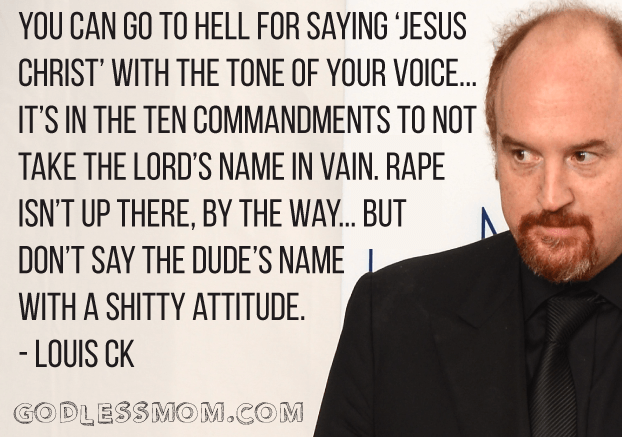 Is this “not committing crimes” thing really a Christian value? Only three of the Ten Commandments are crimes, and those same strictures appear in every other society. Besides, did everyone really think theft, murder, and fraud were okay before Moses came down from Mount Sinai?
Is this “not committing crimes” thing really a Christian value? Only three of the Ten Commandments are crimes, and those same strictures appear in every other society. Besides, did everyone really think theft, murder, and fraud were okay before Moses came down from Mount Sinai?
Countries with Shari’a treat theft much more harshly than Australia does. In Saudi Arabia you can lose a hand for stealing. Also, Saudi Arabia still has the death penalty, and not just for murder. In several Muslim-majority countries stoning to death for adultery and homosexuality still occur. Australia saw sense years ago and no longer has the death penalty. In 2010 the federal government passed a law forbidding any state from reintroducing capital punishment. Good on them.
Perhaps Oriel would like to add Australia to the list of thirteen countries in which atheism is punishable by death. (Afghanistan, Iran, Malaysia, Maldives, Mauritania, Nigeria, Pakistan, Qatar, Saudi Arabia, Somalia, Sudan, United Arab Emirates and Yemen.)
“Losing the Christian Faith Will … Extinguish the Light of Liberal Democracy”
No. Just no. Like many Western Christians, it seems Oriel wants to take credit for both democracy and the Enlightenment. The original idea of democracy, of course, came from the Greeks. From the History Channel website:
In the year 507 B.C., the Athenian leader Cleisthenes introduced a system of political reforms that he called demokratia, or “rule by the people.” This system was comprised of three separate institutions: the ekklesia, a sovereign governing body that wrote laws and dictated foreign policy; the boule, a council of representatives from the ten Athenian tribes; and the dikasteria, the popular courts in which citizens argued cases before a group of lottery-selected jurors.
In 500 BCE, the Greeks were busy worshiping Zeus and his family. Jesus had nothing to do with it – the BC should be a hint there.
As for the Enlightenment, while many of the leading thinkers were Christians, at least nominally, I’m not sure how much credit Christianity can take for it. Their religion was more a sign of the times than anything else. As a result of their ideas, the general trend amongst them was a move towards atheism, or at least deism. Wikipedia describes the Age of Enlightenment thus:
The Enlightenment included a range of ideas centered on reason as the primary source of authority and legitimacy, and came to advance ideals like liberty, progress, tolerance, fraternity, constitutional government, and separation of church and state.
The phrase: “…reason as the primary source of authority and legitimacy …” is not a characterization of any religion. It does describe atheism.
Global Peace Index
Extending from the above, the most peaceful countries around the world are also those with the highest levels of atheism. The more conservatively religious a country is, the less peaceful it is.
Iceland is consistently number one in the Global Peace Index but less than 10% of the population go to church once a month of more. (See here.) New Zealand is currently number two, and is consistently in the top five. At our last census (2013) 41.9% of the population put their mark in the “no religion” box. Most of the other countries in the top echelons of the index are also amongst the least religious in the world.
The USA is 114th/163. Most of the bottom countries are conservative Muslim-majority countries. The exceptions are North Korea (DPRK), which ranks 150th and Russia, which is 151st.
Russia is a conservative Christian country – mainly Russian Orthodox. (See here.)
Christians like to call North Korea an atheist country as that suits their narrative best. Actually they worship their dear leader, Kim Jong-un, and his father and grandfather. Just because the gods are or were alive recently does not make their followers atheists!
Christian countries come higher on the list because of the influence of the Enlightenment, not the other way ’round. You can, in fact, thank atheists for your liberal democracy.
Corruption Perceptions Index
Another global indicator that demonstrates that Christianity is not necessarily an indicator of positive behaviour is the Corruption Index. This is an annual index by Transparency International. Those countries that do best are not the most Christian countries, but the most atheist countries.
(Map is interactive. Click and drag to find your country. Hover over it to find its score and place on the index.)
The two countries that are currently first equal on the list, Denmark and New Zealand, are also two of the most atheist nations in the world. Most of the other nations near the top are also trending towards atheism, such as Norway, Sweden, and Great Britain. Last year, New Zealand went down to number four in the index. It made the national news here because people wanted to know why. Who did something to destroy our reputation?
And there was a reason we were down. New Zealand got a mention in the Panama Papers because a loophole in our banking regulations around Trusts meant it was possible to deposit illegal money here. There was a change in the law, and that loophole is gone. So are the dodgy trusts, and we’re back at number one.
(Table is interactive. Scroll using bar to right of table.)
The “…Fall of [Christianity] in the West Herald[s] the Death of the Greatest Civilisation in the World …”
As I hope I’ve shown, religion does not make a country more prone to civilization. Western countries with a history of Christianity are more likely to be democratic, but that’s the influence of the Enlightenment, not Christianity. Western countries where the values of the Enlightenment have not become part of the culture, like Russia, are in as bad a state as several in the Middle East.
Oriel does not need to worry that ticking the “no religion” box is a bad thing for her country. In fact, it’s a positive thing.
If you enjoyed reading this, please consider donating a dollar or two to help keep the site going. Thank you.

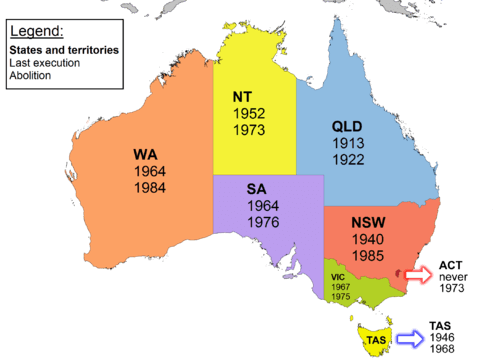
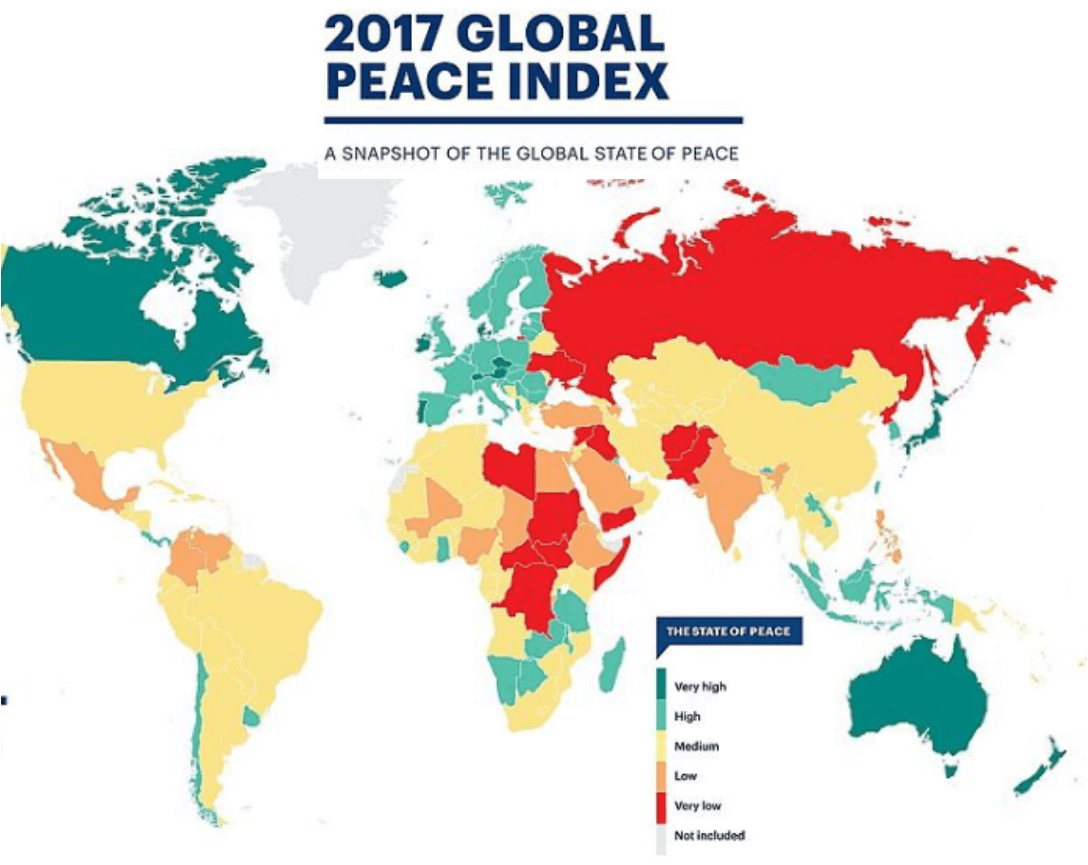
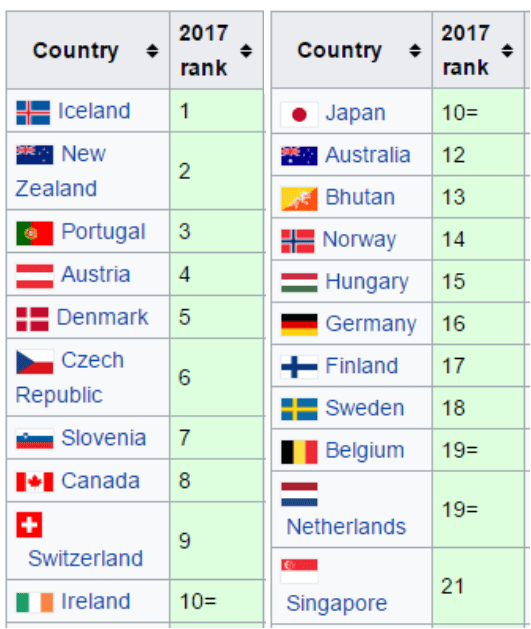
• The phrase: “…reason as the primary source of authority and legitimacy …” does not describe atheism. Nothing about atheism is intrinsically rational. Indeed the exercise of reason naturally leads to truth and therefore to God.
• Regarding the supposed correlation of atheism with the so-called “peace” index: (1) correlation — where such actually exists — is not causation; (2) the so-called “peace” index is a junk statistic (look it up); and (3) per Wikipedia (citing the CIA/State Dept. World Fact Book), the countries where more than half the population is religiously unaffiliated are the Czech Republic, North Korea, Estonia, Japan, Hong Kong, and China. (Trying to recall what those societies contributed to the Enlightenment.)
• You whistle past the inconvenient fact that the Enlightenment is solely the product of the Judeo-Christian West, and is rejected by most of the non-Judeo-Christian world. How do you account for that?
in reply to j.a.m.:
I will just address your third point (your two first points are the classical brainwashing you receive at religious schools).
The Enlightment is not the product of Judeo-Christian West, it was a reaction against Christian religions who tried to control the whole of society, its politics, its social life, its philosophy and its thinking. The Christian religion destroyed any scientific thinking that was developed by the (non-Christian) thinkers in ancient Greece and also Rome, leading to the dissapearance of Science during the so-called Dark Ages. During this period, science and scientific thinking was flourishing in China, for example, and it started also to become important in the early centuries of Isam, mainly because writings by the Greek philosophers became available in Arabic translations. However, Islam caught up with science by replacing all centers of learning by madrasses, stamping out critical thinking. Christianity lost the battle against critical thinking during the Enlightment, and we hope that something similar will happen in the Islamic world.
When you have proved your God, or indeed any god, exists, get back to me. You can’t claim reason when your whole system depends on belief in a magic sky father.
I dealt with North Korea. China and Japan also only fit your facts because they approach the issue differently to you. Shintoism, for example, believes in something similar to The Force of Star Wars fame. Buddhism believes in things like fate.
You are right about the Czech Republic. It’s the only former communist bloc country to retain majority atheism. I’ve never looked into why that is so can’t comment. I’ve never looked into that side of Estonia either, but I do know women’s rights there are amongst the strongest in the world. Those two countries aren’t enough to convince me of your hypothesis though.
And the fact remains that the Enlightenment led people away from Christianity or any other religion. Its influence is to make Christianity more liberal. Your country was founded by atheist thinkers, like it or not. It is now one of the few Western countries that retains a strong religious influence in government despite its excellent First Amendment.
Our country was founded by patriots who shed blood from Bunker Hill to Yorktown. They believed in liberty and the right of people to worship as they see fit, but they were not atheists. They most certainly did not fight and die for atheism. Nor would the Constitution and Bill of Rights ever have been adopted if God-fearing citizens had suspected they were establishing an atheistic republic. (How could atheists found a country anyway? “In Nothing We Trust”?)
Once again, it’s rich being lectured about the Enlightenment by a loyal subject of the same ignominious monarchy that American patriots deposed centuries ago. (How can one not believe in God, if God is in charge of succession planning for one’s own heads of state? Say what one will about Trump, at least he hasn’t held office since before most of the population was born.)
You still tap-dance around the question: How do you account for the fact that it’s the Judeo-Christian West that gave rise to the Enlightenment, whereas much of the rest of humankind has ignored or rejected it?
Point 1 : of course atheism is rational and hypothesising about a God is irrational. Why? because we need an explanation for complexity and intelligence. Proposing a highly complex and intelligent God a priory makes no sense. You are begging the question.
The only mechanism we know that increases complexity and lead to intelligence is natural selection. If you have an alternative mechanism, I’m all ears (and if it will not give you a Nobel prize -question of categories-, but it will at least give you a Templeton one).
Point 2 : the Netherlands, 68% not affiliated. Did the Netherlands have nothing to do with the Enlightenment? Spinoza, Montesquieu, Descartes and many others found refuge, publishing possibilities and/or an accommodating ‘climate’ there. France, not more than half, but still 44% and an officially secular state. France, nothing to do with Enlightenment? I rest my case.
Point 3: The Enlightenment was -among other things- a reaction to religious wars (eg. the 30 years war and the 80 years war) and absolute monarchy. Little to do with Judeo-Christianity.
God is simple, not complex.
http://www.iep.utm.edu/div-simp/
In reply to j.a.m
God is simple, not complex.
http://www.iep.utm.edu/div-simp/
Theology is not philosophy! While religion has lost its hold on science during the Scientific Revolution, it now tries to hold on to philosophy by infusing its theological nonsense.
I know a German teacher who teaches German to imigrants as part of an integration effort. As part of the course she set out discussing the parts of the human body. She started with the head, but didn’t get far. When she arrived at the mouth, tongue, lips, there was immediate protest: We are not allowed to use these words. We cannot mention anything between the nose and the chin! Why? the teacher asked. Because it is written, it is our law. Trying to reason with them was absolutely useless, they clearly were the product of thorough brainwashing at an early age.
That ‘God is simple’ trope does not make any sense. A God that can think, is intelligent, can hear our prayers, make females out of ribs, make ethical judgements (admittedly often of dubious quality), design souls and universes, is nescessarily complex.
No amount of sophisticated theology can change that. What is the mechanism?
I mean, the God-concept itself does not make much sense, but the concept that such a being would be simple is nonsense squared.
Oh, silly atheist. It’s so much easier to just make shit up, don’t you know.
@Ken, yes, I do know, in theological sophistry anything goes. Even nonsense squared, obviously.
Yes, thinking is hard. Much easier to think about nothing.
Which is what believers do imo. They can’t answer a question so just say, “God did it.” It’s a cop out. It stops deep thinking on any topic.
Thinking must indeed be hard, if all you can produce is baseless fiction.
@HH: Yes, I suppose that may be so for some. Similarly, many avowed atheists excuse themselves from any serious thinking and just say: “God didn’t do it. I figured that out by age 3.”
One can’t expect much deep thinking in a world where most people are preoccupied with the daily struggle to survive. But it’s a shame that more people with the means to try it, won’t.
@Ken: I don’t produce fiction myself, but I hear it’s not that easy. They award Nobel and Pulitzer prizes for it. And could anything be more “baseless” than atheism, i.e., a firm belief in nothing?
You’re producing fiction right now. The only question of mild interest is whether you’re lying about it to us all or just to yourself.
I disagree with the other parts of j.a.m.’s comment, but …
… isn’t true, or rather, is true only for some varieties of atheism. Many atheists, especially (secular) humanists and those active on social media and elsewhere (overlapping groups) do value reason, but others are simply apathetic towards religion, and some (too many) embrace all kinds of pseudoscience and non-religious woo. Sadly.
/@
What j.a.m. is saying is that religion is not based on reason, I agree with that. Reason leads to the rejection of a benevolent and omnipotent god.
Or even a malevolent and impotently obsessed god.
“Indeed the exercise of reason naturally leads to truth and therefore to God”: only if you are a brainwashed moron.
Great article Heather. The Global Peace Index is especially telling.
I would like j.a.m. to delineate the process, not simply make a sweeping statement like that and offer no proof of how this is so — Just how does “the exercise of reason “naturally lead to truth and therefore to God”? And just what is meant by equating truth to God? It’s true that I’m drinking coffee as I type. Is that God? j.a.m.’s statements are gobbledygook to me, but then I’m an unbeliever (and that’s true, so that’s God? — am I getting it yet?).
Careful what you wish for, Jenny. Several of us have invested time in the past trying to get jam to “delineate the process”. The effort only showed that he couldn’t or wouldn’t do so, yet has no compunction against wasting people’s time heaping his crap on ever more thickly. Before wasting your own time, have a read of the last full-blown attempt to get a straight answer out of jam from a year ago https://www.heatherhastie.com/ive-finally-found-a-use-for-trigger-warnings
@K: Ah, those were the days, my friend! A comments section really does not lend itself to coherent dialogue, and a lot gets lost in translation. Still, we managed to become pals.
Excuses for your failure. The comments section in which you willingly spent so much time, has been perfectly adequate at showing the weakness of your arguments, your avoidance of questions that expose your incoherence, and your willingness to engage in bad faith. No point trying to pretend otherwise now.
Just trying to give the benefit of the doubt.
More like clutching at straws.
@JH: Yes, God is Truth.
http://readingthesumma.blogspot.com/2010/05/question-16-truth.html
“…in the midst of death, life persists; in the midst of untruth, truth persists; in the midst of darkness, light persists. Hence I gather that God is life, truth, light. He is love. He is the supreme Good… God to be God must rule the heart and transform it… This can only be done through a definite realization, more real than the five senses can ever produce… It is proved not by extraneous evidence but in the transformed conduct and character of those who have felt the real presence of God within… Such testimony is to be found in the experiences of an unbroken line of prophets and sages in all countries and climes. To reject this evidence is to deny oneself.” — Mahatma Gandhi
https://www.youtube.com/watch?v=pSWzFz-tGrM
So now you’re a Hindu? You missed the bit that makes most sense “…I confess I have no argument to convince through reason. Faith transcends reason…”. If only you could be honest like Gandhi.
If that’s the worst they say about me (that I’m no Gandhi), so be it.
Ha. Afraid it will be a long list, starting with hubris at the very top.
I’m not a real fan of Gandhi, wellyes, he was good on non-violent protest, which works in a system with at least a modicum of decency ( the Nazis, Stalinists, Khmer Rouge or NK would simply have slaughtered the peaceful protesters, without second thought).
I find him a bit of a navel-gazer, who had little interest in the environment surrounding him, too.
He was also a bit of a hypocrite, advocating Aryuvedic medicine, but choosing ‘Western” surgery when suffering appendicitis.
So yes, he was good, but just like all of us with his human shortcomings. It is not that I do not admire Gandhi in some ways, but I dislike the demi-god like adulation he is held in by many.
Thanks Claudia. I appreciate it. 🙂
Yes, great article Heather, and good research, as usual.
Thanks!
Thanks so much. 🙂
I notice that of the 10 most corrupted countries on the Corruption Perception Index, only 3 are not Islamic: Angola, South Sudan and Venezuela
In general, it looks to me as if the more conservative the religious climate in a country, the more corrupt it is. Not having women in positions of power looks to be another factor.
Afghanistan, Iraq, Libya, Somalia, Somaliland, Syria and Yemen, (alphabetic order, something I normally oppose). Another thing, apart from being Islamic, these countries have in common is war. Is it Islam or war that corrupts? Might the ‘Religion of Peace” and war have some connection?
(And oops, 4 of eleven, didn’t see the DRNK)
But I also note that not a single Islamic country is in the ‘Light Orange’, let alone ‘Yellow’, zone.
[And as usual NZ is left off the map entirely 🙁 ]
NZ is there – you have to click and drag the map with your mouse. It’s possible that doesn’t work on some devices or operating systems.
Yep, you’re right. Didn’t drag it, sorry about that. And NZ is light ‘yellow’, as expected.
But that detract us from the point: is it war and strife that corrupts, or Islam, or are they connected?
I think there is a connection, but one that shouldn’t be over played, particularly in the countries mentioned, where Western military interventions have been such a strong factor in creating ongoing instability.
Got a point there, but we should not overdo it either. Afghanistan has been unstable, a ‘wild West’, since human memory. Iraq was kept ‘stable’ by Saddam’s Iron Fist (it can even be argued that many Iraqis are better off know, especially the Kurds). Syria and Iraq are quite alike: stable do to ‘Iron Fistedness’. And Lybia too to some degree. Nor would I overestimate the stability of Somalia/ Somaliland under Syad Barre. I doubt whether the ‘West’ had very much to do with the interminable civil wars in Sudan (and now also South Sudan).
The Cold War, of which ‘East’ and ‘West’ were equally culpable, led to a lot of interference in these generally pre-existing conflicts, no argument there.
Of course, if we count the Saudi support for subversive Wahhabism as being caused by the ‘West’ via petrodollars and within ‘cold war context, we would have a stronger case. That, however, leads us straight back to the possible link between Islam and war & strife.
“It was to urge people to mark the “NoReligion” option on the census form.”
What are the other options? Asking people to indicate their religious affilation is a very questionable idea. For example, in Belgium it is illegal to record someone’s religious affiliation, while in the Netherlands this is asked when people register for identity cards etc. A consequence was that almost the entire Jewish population in the Netherlands was deported during WWII by the Germans, and perished, while in Belgium the Germans had no way to trace Jews, except by ransacking Jewish quarters, which limited their deportation to 50 percent. In Germany you have to indicate on your taxform your religion, or lack of it, which results in additional taxes called Church taxes, except if you indicate “none.” I think it is not a government’s business to fund religions, but Germany is not really a secular state.
In Australia (and New Zealand) people trust the integrity of the census system. No one is individually identified, and when results are published there’s never a set if one. That means, for example, in a list of all occupations in the country the public data shows there are three prime ministers and three governors general. (There’s only ever one of each of these obviously.)
It’s actually worse than you describe in Germany. At birth you are automatically ascribed the religion of your parents, and when you start paying taxes 5% is automatically taken. Stopping this means filling out an official form (and paying a fee).
Worse than that, the Catholic Church keeps records world wide on who was baptized. If you move to Germany having been baptized as a kid, they will check up on you and collect the tax too.
That is only partially true.
1- The Netherlands had a quite complete population register, used by the Nazi’s. (The Amsterdam one was blown up by the resistence in March 1943, destroying the data of about 70 000 Amsterdam Jews).
2-The Netherlands suffered a ‘civil occupation’, while Belgium had a ‘military occupation’. That must have made a difference too.
The Ten Commandments are not the basis of Christianity.
NT Christianity teaches you that your behavior doesn’t matter at all. Go Google the doctrine of Sole Fides. The pivotal issue is NOT your behavior; it’s whether you have the right hocus-pocus. And, the bunch of them can’t agree on what that is.
L